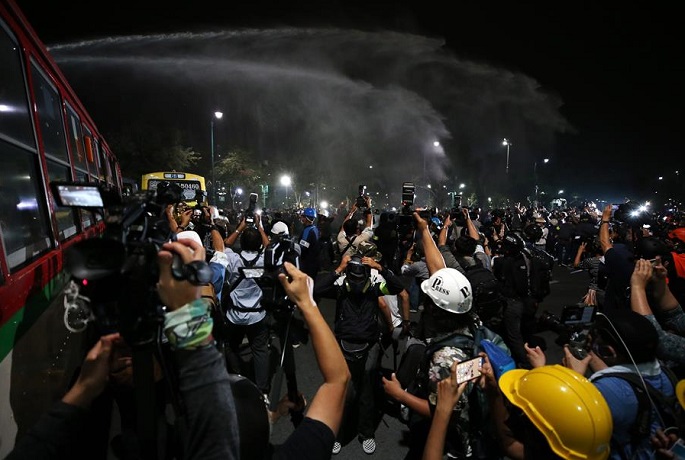Police use water cannon to disperse protesters in Bangkok
Published : 08 Nov 2020, 17:32
Police in Thailand have fired water cannons and deployed riot police after the student-led pro-democracy movement took to the streets of central Bangkok en masse once again on Sunday to deliver petitions addressed to King Vajiralongkorn, the latest gesture of defiance of the monarchy, reported EFE-EPA.
Thousands of demonstrators gathered at the iconic Democracy Memorial in the historic center of the Thai capital and set up several letterboxes encouraging Thai citizens to submit their complaints and petitions to the monarch, after which they marched to the Royal House Office with the intention of delivering the letters.
The protest, organised through social media by the People's Movement and the Free Youth platform, was initially peaceful, despite concerns about possible clashes with a small group of monarchists who gathered nearby.
Police deployed numerous riot police and roadblocks to protect the Royal House Office, and when demonstrators arrived to deliver petitions, some clashes occurred and security forces used water cannons to break up the rally.
This was the second time that the authorities have used such methods to end a gathering of the movement that started on 18 July and has been gaining momentum ever since, after clashes on 16 October also ended in riot police firing water cannons at protesters, which included many school children and university students.
Reform of the monarchy is the boldest and most contentious demand of the students leading the protests, who are also demanding the resignation of the prime minister, former general Prayut Chan-ocha, and the drafting of a new constitution.
The protesters accuse the prime minister, who led the 2014 coup d'état, of being elected in 2019 after elections that were dismissed by the opposition and international observers as lacking transparency and fairness.
They also criticise the certain elements in the constitution that was drafted by the previous military junta, such as the military’s ability to hand pick members of the Senate.
Discussions of reform to the monarchy - which has long been shielded from public criticism - is by far the most controversial demand because of the devotion the institution enjoys from millions of Thais and the lèse-majesté law, which punishes anyone who criticises the royal house with up to 15 years in prison.
The demands also seek to reduce the power of the military, which has taken power in 13 coups since the end of the absolute monarchy in 1932.
The students are demanding that the king refrains from ratifying any coups d'état. The current king’s late and revered Bhumibol Adulyadej, who reigned from 1946 until his death in 2016, signed off several coups during his reign, including the one led by Prayut six years ago and the one before that in 2006.
His son, King Vajiralongkorn, spends most of his time in Germany and lacks his father's charisma and respect. His absence from the country and his opulent lifestyle in the mountains of Bavaria have drawn criticism during the Covid-19 pandemic, which is hitting the Thai economy hard.


